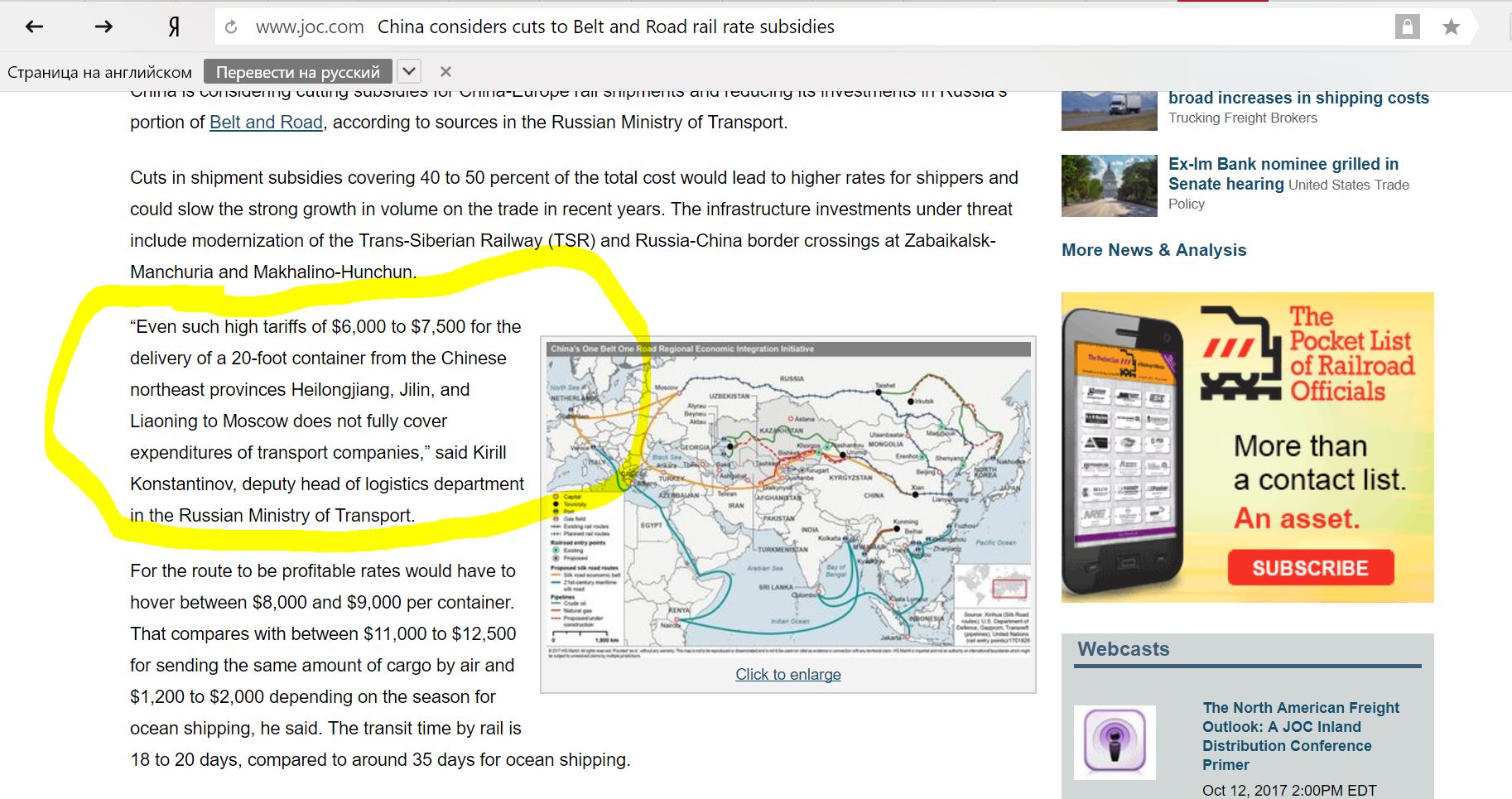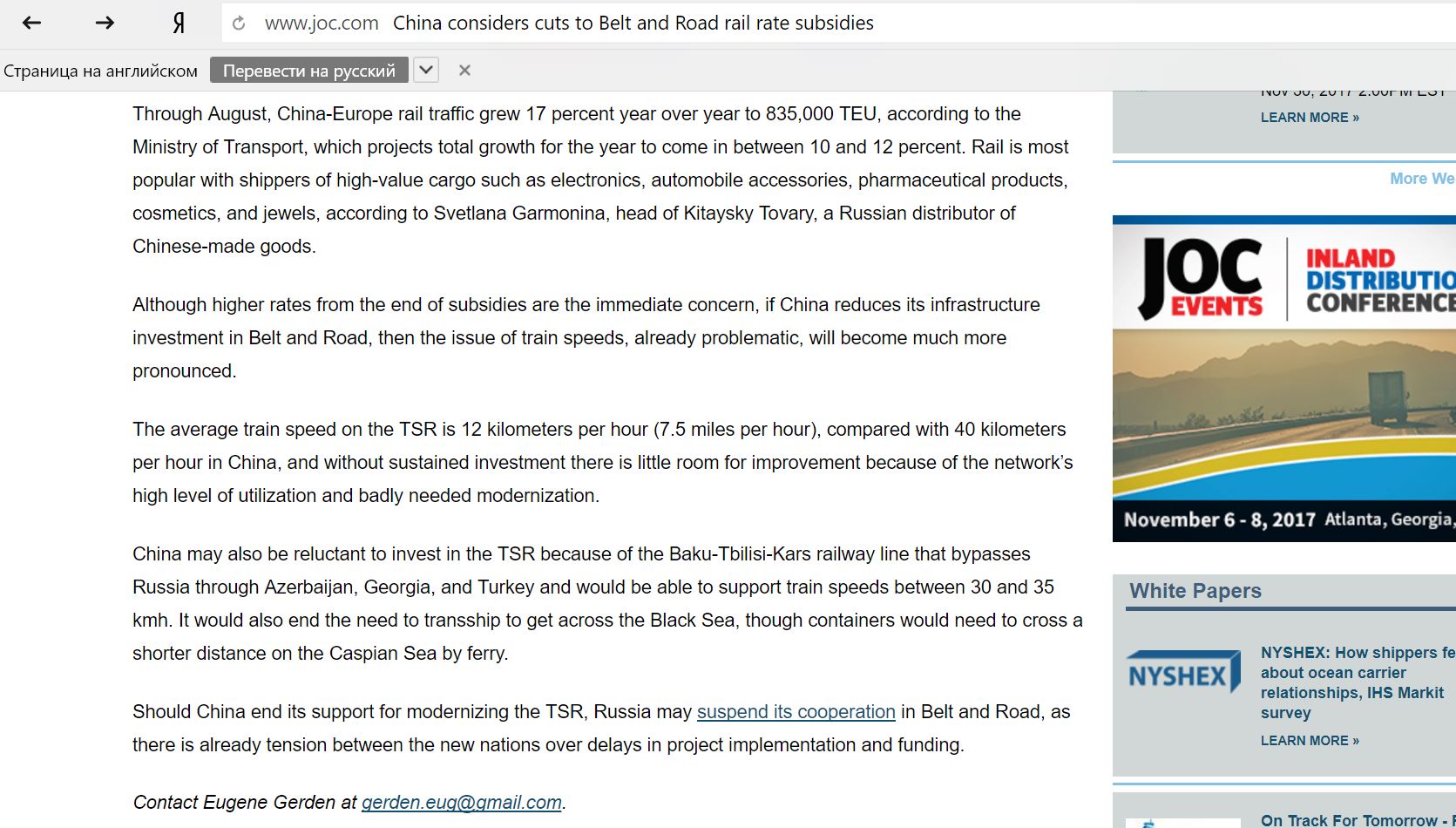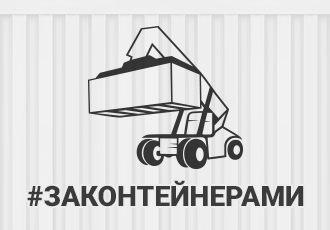JOC’s stories on Russian rail transit
Автотранспорт | Исследования | Контейнеры | Логистика | Новости | Рейтинги | Ноябрь 02, 2017, 22:39

We have somehow foreseen it several years ago…. Since the Russian railway industry has started approaching a million TEU a year in transit, the western world was flabbergasted. So they started pondering, what to do, and decided to follow patterns which work well in politics.
It turns out, they do not work in business as well: the community is small, and everybody knows each other.
We have touched on the subject of China’s rail freight subsidies last week in passing, and this week there is a detailed report in Journal of Commerce (joc.com) – a respectable news site for the container industry.
What’s there?
1) Try to read whatever article on JOC.com – they’re all paywalled. But for some reason this one is not – it’s free. Russian popular Vedomosti newspaper does that with paid political content. Being a subscriber we feel offended.

2) It goes even funnier next. Who are they quoting, would you think, writing about intermodal transit rates and China considering cutting state subsidies on rail container shipments? – Kirill Konstantinov, deputy head of logistics department in the Russian Ministry of Transport. Now, you sure would not find such a man with the Ministry. But there is no such department there either (I wish there were).
3) The author of the publication is Eugene Gerden, Russia Special Correspondent. Never met the guy. And he is not on Facebook. Do you know many journalists who don’t have a Facebook account?
4) The rates and transit times are given with reference to Svetlana Garmonina, head of Kitaysky Tovary (Chineese goods), a Russian distributor of Chinese-made goods. No such person on social networks, no such company registered with the fiscal agency – not to mention that no sane person in Russia would give a company such a name. Silly scam
5) Next is not even funny. JOC, which is an industry expert, not a general political magazine, writes: “The average train speed on the TSR is 12 kilometers per hour (7.5 miles per hour), compared with 40 kilometers per hour in China”.
The same JOC tells us on many occasions that transit time for Asia-Europe container trains averages 14 days. 12,000 kilometres divided by 14 days is 857 kilometres per day. Automatically generated data posted on Russian Railways’ website says, that on cheaper routes trains travel 800 kilometres per day, on expensive services – 1200 kilometres per day. And now a cherry on top: “China may also be reluctant to invest in the TSR because of the Baku-Tbilisi-Kars railway line that bypasses Russia through Azerbaijan, Georgia, and Turkey and would be able to support train speeds between 30 and 35 kmh” – JOC gives its expert guess. Well, go for it!
Новости по теме
-
Электронная очередь в пунктах пропуска через госграницу РФ: разбираем принципы работы и рассматриваем результаты
Начинается цикл семинаров по работе с системой электронного резервирования даты и времени подъезда к пунктам пропуска через государственную границу РФ (СРВ)
-
Погрузка на транспорте в Китае в январе-феврале 2024 года выросла на 7,4%
Объем погрузки на транспорте в Китае по итогам первых двух месяцев 2024 года составил 7,7 млрд тонн, что на 7,4% больше, чем за аналогичный период прошлого года
-
«Трансконтейнер» в 2023 году увеличил автоперевозки на 6% до 291 тыс. TEU
Автопарк компании составляет более 100 тягачей и более 200 полуприцепов-контейнеровозов
Свежие новости
-
Финпоказатели Maersk несколько улучшились, но линейный бизнес остается убыточным
Группа Maersk по итогам первых трех месяцев 2024 года получила 177 млн долларов операционной прибыли по сравнению с более чем полумиллиардным убытком в предыдущем квартале
-
За два года FESCO перевезла на линии между Новороссийском и Турцией более 40 тыс. TEU
Транспортная группа FESCO за первые два года работы регулярной контейнерной линии FESCO Turkey Black Sea перевезла между Новороссийском и турецкими портами Гебзе и Стамбул более 40 тыс. TEU
-
«РЖД Логистика» отправила первый «Агроэкспресс» из Челябинской области в Индию через Иран
«РЖД Логистика» (РЖДЛ, входит в РЖД) отправила с ТЛЦ «Южноуральский» в Челябинской области (проект «Государственной транспортной лизинговой компании», ГТЛК) первый контейнерный поезд «Агроэкспресс» по восточному коридору МТК «Север – Юг» в Индию
-
Погрузка РЖД в апреле сократилась на 3,6% до 101,7 млн тонн
По итогам апреля 2024 года погрузка РЖД составила 101,7 млн тонн, что на 3,6% меньше, чем годом ранее. Отрицательная динамика погрузки сохраняется на протяжении последних семи месяцев, начиная с октября прошлого года.
-
В апреле перевалка на зерновом терминале КСК достигла 1 млн тонн
По итогам апреля 2023 зерновой терминал КСК группы «Дело» в порту Новороссийск перевалил рекордный 1 млн тонн грузов, следует из сообщения группы. Предыдущий рекорд погрузки КСК установил в феврале 2024 года, когда перевалил 900 тыс. тонн.









